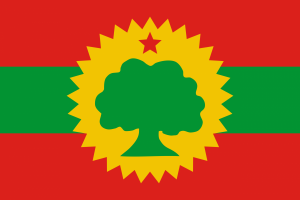Difference between revisions of "Language/Borana-arsi-guji-oromo/Vocabulary/Self-Introduction"
m (Quick edit) |
m (Quick edit) |
||
| Line 1: | Line 1: | ||
<span pgnav> | |||
{| class="wikitable pg_template_nav" | |||
|[[Language/Borana-arsi-guji-oromo/Vocabulary/Common-Greetings|◀️ Common Greetings — Previous Lesson]] | |||
|[[Language/Borana-arsi-guji-oromo/Culture/Traditional-Festivals|Next Lesson — Traditional Festivals ▶️]] | |||
|} | |||
</span> | |||
{{Borana-arsi-guji-oromo-Page-Top}} | {{Borana-arsi-guji-oromo-Page-Top}} | ||
| Line 93: | Line 100: | ||
{{Borana-arsi-guji-oromo-Page-Bottom}} | {{Borana-arsi-guji-oromo-Page-Bottom}} | ||
<span pgnav> | |||
{| class="wikitable pg_template_nav" | |||
|[[Language/Borana-arsi-guji-oromo/Vocabulary/Common-Greetings|◀️ Common Greetings — Previous Lesson]] | |||
|[[Language/Borana-arsi-guji-oromo/Culture/Traditional-Festivals|Next Lesson — Traditional Festivals ▶️]] | |||
|} | |||
</span> | |||
Revision as of 22:47, 2 April 2023
| ◀️ Common Greetings — Previous Lesson | Next Lesson — Traditional Festivals ▶️ |
Introduction
Welcome to the Borana-Arsi-Guji Oromo course! In this lesson, you will learn how to introduce yourself and ask for someone's name in Borana-Arsi-Guji Oromo. This is an essential skill to master when learning a new language, as it allows you to establish a connection with native speakers and make your way around a new place.
In this lesson, you will learn:
- How to introduce yourself
- How to ask for someone's name
Let's get started!
Self-Introduction
One of the first things you'll need to do when meeting someone new is to introduce yourself. Here's how you can do it in Borana-Arsi-Guji Oromo:
| Borana-Arsi-Guji Oromo | Pronunciation | English |
|---|---|---|
| Ani dubarti | ɑni dʊbˈɑrtɪ | I am called... |
To use this phrase, simply replace the ellipsis with your name. For example, if your name is John, you would say "Ani dubarti John."
It's important to note that in Borana-Arsi-Guji Oromo, there are different ways to say "I am called" depending on your gender. If you are male, you would say "Ani dubarti," while if you are female, you would say "Nan dhagahamti."
Asking for Someone's Name
Once you've introduced yourself, you'll want to ask for the other person's name. Here's how you can do it in Borana-Arsi-Guji Oromo:
| Borana-Arsi-Guji Oromo | Pronunciation | English |
|---|---|---|
| Doo dhuuftu? | doʊ dʊftu | What is your name? |
To use this phrase, simply ask "Doo dhuuftu?" and then wait for the other person to respond. Alternatively, you can introduce yourself first and then ask for their name, like this:
| Borana-Arsi-Guji Oromo | Pronunciation | English |
|---|---|---|
| Ani dubarti...Doo dhuuftu? | ɑni dʊbˈɑrtɪ...doʊ dʊftu? | My name is...What is your name? |
Now that you know how to introduce yourself and ask for someone's name, it's time to practice! Find a friend who speaks Borana-Arsi-Guji Oromo or start practicing these phrases on your own, and you'll be well on your way to mastering basic greetings and introductions.
Cultural Information
Learning the Borana-Arsi-Guji Oromo language is not just about vocabulary and grammar - it's also an opportunity to learn more about the rich culture and traditions of the Borana-Arsi-Guji Oromo people. Here are some interesting facts and cultural information about the Borana-Arsi-Guji Oromo to help you broaden your understanding of this fascinating community:
- The Borana-Arsi-Guji Oromo are a subgroup of the Oromo people, who are one of the largest ethnic groups in Ethiopia.
- The Oromo people have a long history that dates back to ancient times, and their language has played an important role in shaping Ethiopia's history and identity.
- Borana-Arsi-Guji Oromo culture is deeply rooted in pastoralism, which involves the raising of livestock such as cattle, sheep, and goats. This way of life has a significant impact on the social structure, economy, and worldview of the community.
- Music and dance are an integral part of Borana-Arsi-Guji Oromo culture, with many traditional songs and dances performed during important events and ceremonies.
- Borana-Arsi-Guji Oromo weddings are elaborate and extensive affairs, involving multiple days of feasting, dancing, gift-giving, and ritual practices.
Conclusion
Congratulations, you've made it through the self-introduction lesson! You've learned how to introduce yourself and ask for someone's name in Borana-Arsi-Guji Oromo, as well as gaining a deeper understanding of the culture and traditions of the Borana-Arsi-Guji Oromo people. Keep practicing and building on what you've learned so far, and you'll be well on your way to mastering the basics of the language.
Other Lessons
- Fruits
- Languages Afaanoota
- Feelings and Emotions
- Describing Relationships
- Animals
- Geography
- How to Say Hello and Greetings
- Drinks
- Count to 10
- Days of the Week
Template:Borana-arsi-guji-oromo-Page-Bottom
| ◀️ Common Greetings — Previous Lesson | Next Lesson — Traditional Festivals ▶️ |
